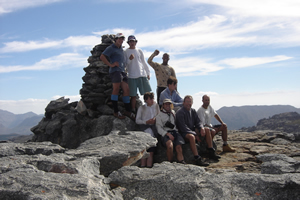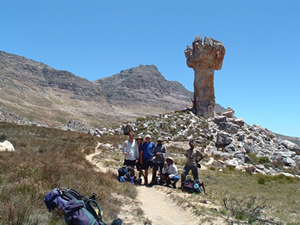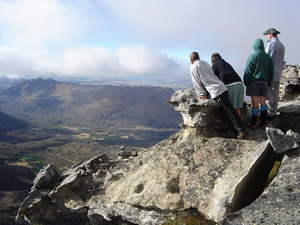Outdoor Education

Bishops is set in the heart of a city on a Peninsula flanked by the Indian and Atlantic Oceans and overlooked by Table Mountain. Nowhere else in the world does a city merge so easily with nature.
It means that the outdoors, and, especially, respect and appreciation of the environment, play a huge part in the education offered at the school. Bishops boys are fortunate in that they have access to activities that would be impossible in other parts of the country. Where else can a boy enjoy a day of mountain-climbing just ten minutes’ drive from his school? Or spend his week-ends cray-fishing off the rocky coves of the Cape coast?
The sea and mountains, with their abundance of animals, birds and the indigenous fynbos, are classrooms filled with infinite resources, and the boys and their teachers never seem to get enough of them.
After the November examinations, every boy from grades eight to ten heads into the outdoors for a week. They can go rock-climbing, fly-fishing, canoeing, mountain-biking or hiking along the coast or in the adjacent mountain ranges.

The Bishops Epic is a journey at the end of the year by Grade 10 boys through a series of bases across the Cederberg where they will experience a wide range of activities which will test them physically and mentally and allow them to appreciate the landscape as well as the people and the history of the area.
The school also runs an Outdoor Adventure Centre called High Noon on a farm in the Cape mountains near Villiersdorp. It’s a facility used for everything from confirmation preparation and biology outings to trout-fishing and athletics camps.
Within this majestic environment is a city made up of many cultures, which the boys are taught to understand and respect through regular field-trips and constant discussion and research. A field-trip could be an excursion to see the Malay architecture in the Bo-Kaap, or the District Six museum to learn about apartheid’s forced removals.
The harsh realities of living in a city with serious social problems and the accompanying health and welfare issues are regularly introduced into the classroom. A project on tuberculosis, for instance, can give a boy greater insight into just one of the issues that dominates the lives of many in the Western Cape.

Going outside the boundaries of the school can also mean experiencing the world abroad, either through sports tours or an exchange programme with a similar school in the United Kingdom, Australia or the United States. Schools like Harrow, Milton Abbey (UK), Groton (US) or Kings (Australia) regularly host and send students to Bishops as part of an exchange that broadens the entire school community’s world view.
Bishops is constantly working at ways to integrate outdoor education into the curriculum because, after more than a century and a half in the education business, the school realises that the best results are achieved when learning is fun.